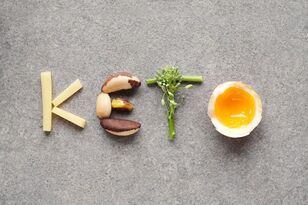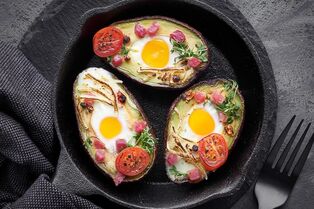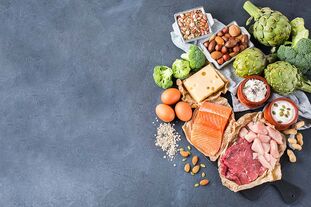The ketogenic diet is not the easiest diet for beginners. Since keto almost completely restricts carbohydrates, choosing a variety of protein options isn't always easy. However, the main objective of this diet is precisely to give up carbohydrates, which helps to lose weight.
Below, in the material, we will find an example of a daily ketogenic diet - detailed menus will help you eat not only healthy, but also delicious. In addition, we will inform you about the rules for entering a ketone diet; It is especially important for beginners to switch to a carbohydrate-free diet in stages.
What is the ketogenic diet?

The ketogenic diet is a diet plan that involves avoiding carbohydrates. The mechanism of the ketogenic diet is based on the fact that when carbohydrates are excluded, a person's blood glucose level drops and the body enters a ketogenic mode; in this case, free fatty acids and fat stores become the main source of energy.
The advantage of the ketogenic diet is losing weight quickly without calorie control. Studies show that the ketogenic diet shows the best long-term results, that is, with its help, you can not only burn fat, but also maintain the achieved shape for a long time.
However, the ketogenic diet has contraindications. First, it is prohibited for pregnant and lactating women, as well as teenagers. Second, such a diet is not combined with insulin injections for diabetes or high blood pressure. Third, for some chronic diseases.
Meals per day
For beginners on the ketogenic diet, it is recommended that you cut out fast carbs. With that being said, if you've never tried a carb-free diet before, spend the first 7-10 days changing your eating habits to minimize simple carbohydrates in your diet. The egg diet is also suitable for beginners.
If you are already familiar with the method of restricting carbohydrates in your diet, the easiest way to enter a ketogenic diet is intermittent fasting, for example according to the 16/8 scheme. Follow this regimen for at least 5-7 days to lower your blood glucose levels and move more smoothly into full ketosis. It is important that beginners take their time.
I don't understand at all why so many nasty things are being written about this power system. I am 32 years old and I have always liked sweets. Just to shake. As a result, I feared for my health. I've been eating keto for 2 months now and this is the best thing that ever happened to me! The energy was simply discharged, I could work until 12 and get up at 6. I lost 13 kg and I did not count calories, I was not hungry, and there are many recipes with allowed foods.
Ketogenic Food - What Can You Eat?

The ketogenic diet only allows you to eat foods that do not contain carbohydrates. They do not raise blood sugar levels and prevent the body from breaking out of fat burning ketosis. Flour products, sweets, fruits, juices and soft drinks are completely prohibited. Also, potatoes and other starchy vegetables cannot be eaten with keto.
List of allowed ketogenic foods:
- all kinds of meat (beef, pork, chicken);
- all kinds of fish and shellfish;
- chicken eggs;
- dairy products (butter, cheese, natural cottage cheese, milk in small quantities);
- any vegetable oil;
- any green vegetable;
- walnuts in small quantities;
- berries in small quantities;
- non-starchy vegetables (avocados, pumpkin in small quantities);
- herbs, seeds (including chia seeds), spices
- mushrooms.
Ketogenic Eating Rules
One of the rules of the ketogenic diet is to consume plenty of plain water every day. This helps reduce the negative effects of the diet (in particular, difficulty digesting and the smell of acetone from the mouth). You should also monitor the amount of salt in your diet.
Let us mention separately the need to control the consumption of alcoholic beverages. The keto diet can increase the level of ammonia in the blood; Along with the use of alcohol, this can lead to toxic liver damage. It is for the same reason that the ketone diet is contraindicated in liver and kidney diseases.
Weekly Ketogenic Diet - Daily Menu
To avoid vitamin deficiencies while following the ketogenic diet, it is necessary to include tomatoes, vegetables and fruits with a minimum amount of carbohydrates (various berries, as well as citrus fruits) in the daily diet. In turn, nuts will be a good source of minerals, both peanuts and walnuts, pine nuts or any other.

To avoid vitamin deficiencies while following the ketogenic diet, it is necessary to include tomatoes, vegetables and fruits with a minimum amount of carbohydrates (various berries, as well as citrus fruits) in the daily diet. In turn, nuts will be a good source of minerals, both peanuts and walnuts, pine nuts or any other.
The calorie content of the keto menu below is 1300 kcal. per day, which is suitable for women who want to lose weight with a low level of physical activity. For men, calories and portion sizes should be increased.
1 day Monday
- Breakfast:2 eggs, 10 g of butter, half an avocado, coffee or tea without milk or sugar.
- Second breakfast:a portion of cottage cheese without sugar (15 g).
- Lunch:fish (120 g of fillet) with broccoli and 6 cherry tomatoes, green tea.
- Snack:1 gelatin without sugar and a handful of berries.
- Dinner:chicken breast (120 g) with olive oil (10 ml) and mustard (10 ml). Salad: 3 large leaves of lettuce, 1 cucumber, half a lemon and grated cheese.
Carbohydrates: 24 g, Proteins: 75 g, Fat: 96 g
Day 2, Tuesday
- Breakfast:2 eggs with bacon, keto coffee.
- Second breakfast:gelatin without sugar.
- Lunch:fried meat (120 g) with arugula salad, zucchini and half an avocado; Green Tea.
- Snack:a handful of strawberries or other berries.
- Dinner:fried chicken fillet with mushrooms, fresh leaf salad, half a tomato and cucumber with 10 ml of olive oil; 1/2 cup blueberries
Carbohydrates: 29 g, Proteins: 80 g, Fat: 99 g
3-day Wednesday
- Breakfast:2 hard-boiled eggs, a slice of cheese and 2 spinach leaves; coffee with 10 ml of heavy cream or coconut milk.
- Second breakfast:unsweetened yogurt, a handful of berries.
- Lunch:salad with tuna and fresh cabbage, sesame dressing and soy sauce.
- Snack:2 pieces of dark chocolate without sugar (at least 75% cocoa).
- Dinner:chicken breast with mushrooms, 50 g of pumpkin, salad with tomato and olives.
Carbohydrates: 34 g, Proteins: 88 g, Fat: 101 g
Thursday of the fourth day
- Breakfast:green smoothie with spirulina (10 g) and chia seeds (15 g); slice cheese and ham.
- Second breakfast:a handful of walnuts.
- Lunch:Baked avocado with egg, bacon and cheese. Arugula, cabbage and cucumber salad.
- Snack:unsweetened yogurt
- Dinner:a glass of bone broth, spinach omelettes (3 eggs, half a glass of spinach, 10 g of butter).
Carbohydrates: 29 g, Proteins: 80 g, Fat: 110 g
Friday of the 5th
- Breakfast:scrambled eggs and half a tomato, coffee or tea.
- Second breakfast:a handful of walnuts, 2 pieces of dark chocolate.
- Lunch:beef fillet with mushrooms and spinach, green tea.
- Snack:150 g of melon and 10 g of coconut.
- Dinner:Tomato salad, canned tuna, cucumber and olives, dressed with lemon.
Carbohydrates: 39 g, Proteins: 76 g, Fat: 108 g
Day 6, Saturday
- Breakfast:slices of ham and cheese, green tea.
- Second breakfast:2 boiled eggs.
- Food: 100 g of shrimp stewed with zucchini, olive oil, cheese and arugula.
- Snack:gelatin without sugar.
- Dinner:baked fish with eggplant caviar.
Carbohydrates: 34 g, Proteins: 79 g, Fat: 99 g
Sunday of the 7th
- Breakfast:scrambled eggs and bacon.
- Second breakfast:cottage cheese without sugar, a handful of berries.
- Lunch:Chicken stew with cabbage, mushrooms and sesame seeds.
- Snack:2 pieces of dark chocolate, nuts.
- Dinner: fish soup with pumpkin (50 g) and fried tomatoes.
Carbohydrates: 38 g, Proteins: 88 g, Fat: 102 g
The ketogenic diet is a diet with maximum carbohydrate restriction. For beginners to follow this diet, the most difficult are the first days, when the body rebuilds in ketosis - dizziness and weakness can be observed. In the future, the metabolism changes and the body gets used to working in a non-carbohydrate fat burning mode.






















